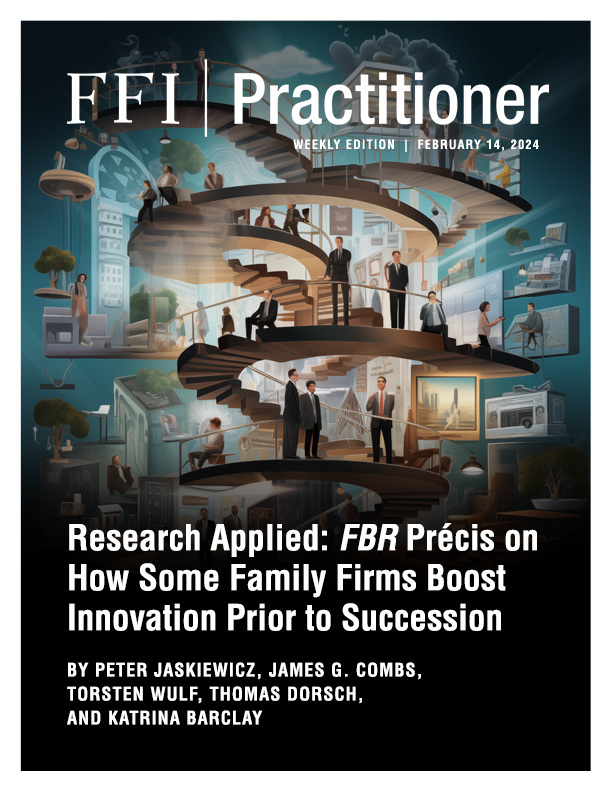
In an effort to find solutions, family business researchers and advisors have focused on the succession process: finding qualified successors, avoiding family drama, listening to the needs of the next generation, developing trust between successor and predecessor—the list goes on. While all these aspects are undoubtedly important, what has not received much attention is the business. Are senior generation family business leaders making the investments to prepare the business for success in future generations? Failure to innovate prior to succession puts successors at a disadvantage and undermines their potential for success.
The uncertainty trap stifling innovation
Senior generation family business leaders are first and foremost driven by their desire to pass on the business. However, even among those eager for a handover, their desire is often clouded by uncertainty about the NextGen’s commitment and capabilities. Our study of 212 family members from 106 privately-owned medium and large family businesses in Germany found that family leaders who are uncertain about potential successors tend to underinvest in innovation in the years before passing the baton. Even if the family leader holds out hope that a family successor will eventually be found, these owners focus much less on rejuvenating the business.
As our study found, family business leaders uncertain about their successors underinvest—possibly to steer the company toward an exit via sale rather than preparing it for a transgenerational legacy. One interviewee illustrated this while recounting how he came to join the family business. Hoping to become a helicopter pilot in the German armed forces, he was turned away after military budget cuts. “This was the first time in my life when I considered joining my parents in the business. Before that, my father managed the business in a way to sell it at the end of his career. Since he knew that I would join the business after my studies, he put more effort in the company to hand it over in good shape in the future.”

Confidence in successors fuels innovation prior to succession
Our research indicates that family business leaders who are confident about having a capable and motivated successor invest significantly more in their business; we identified what triggers such investments years before the actual succession.
First, when the NextGen is actively involved in the family business during childhood and adolescence, senior generation leaders see their potential first-hand and anticipate that the business could thrive for another generation. Second—and more importantly—confidence is maximized when next generation members join the family business as adults. Knowing that there are talented NextGen family members moving through the ranks gives confidence that the firm can stay in the family and motivates others to go the extra mile to boost innovation prior to succession. Family business leaders in our study confirmed this mindset. One managing director of a third-generation services company explained the firm’s focus on innovation. “We are investing a lot to keep up with technological progress and the latest security standards. We always wanted a business that is in good shape for our son to take over.”
The innovation differences we saw were not trivial. When a committed, potential NextGen successor joined the business as an adult, family business owners pursued 20.6% more innovation compared to the average firm. Even more noteworthy, family business owners pursued a staggering 57.3% more innovation when their designated successor had been involved during childhood. “As children, we literally grew up in the office,” said one NextGen member in a second-generation professional services company. “Some of our employees have known me since I was a little boy.”
One major reason innovation increases when the NextGen joins is due to the new ideas and energy they bring. Collaborating across generations, many of the senior generation leaders in the firms we studied leveraged NextGen talents by giving them an opportunity to implement their ideas under supervision and guidance from the senior generation. A third-generation family member in a mechanical engineering company put it as follows: “As the head of our US subsidiary, I am gaining a lot of experience. I focus on growing our market share in North America. At home, my father takes care of the headquarters. Whenever there is something to discuss, we are in close contact.”
Sidebar

The process needs to start early
One important insight from our study is that it is not enough to want to pass on the business; a capable and committed successor must be cultivated. Only those senior family leaders committed to family business continuity and certain of having a committed successor go the extra mile to boost innovation prior to passing the baton.
This finding points to another potential problem: last-minute decisions by next generation members to take over the family business can put the firm at risk. These NextGens’ lack of experience in the business likely led their parents to pursue less innovation, meaning they might inherit a “dinosaur” rather than a “rising star.” They also might not have what it takes to run a family business, especially one that is outdated due to a lack of innovation. Their more experienced peers, in contrast, can start with an innovative and rejuvenated “rising star” enterprise that has been years in the making.
(1) Involve them early: A good bet for business owners with young families is to involve children in the business from an early age. Not only will it help children develop an emotional attachment to the business,2 it will also help senior leaders see the promise and possibility of an eventual family succession.
(2) Involve them later: When NextGens join the family business as adults and progress successfully through the ranks, senior leaders realize there is family talent that can take over and deliberately nurture innovation prior to succession.
(3) Collaborate with them: Innovation efforts are boosted by transgenerational collaborations in leadership. When capable NextGens bring fresh perspectives and experiences, it enhances the business’s capacity to adapt and thrive in an ever-changing landscape.
Conversely, as our study shows, family leaders are more likely to resist change when they are unsure of potential successors’ capabilities and commitment. They can develop “dinosaur syndrome” by not rejuvenating the business. If a family successor shows up last-minute, they might be in double trouble: less prepared to take over and confronting an outdated business.
Securing another generation
The transformative period of wealth transfer in family businesses is not just about succession: it is intrinsically tied to rejuvenating businesses through innovation. As our study shows, leaders unsure of a successor’s capabilities and commitment often resist change, risking the company’s future, whereas those confident in the family successor invest more in innovation and prepare the business for transgenerational success.
References
1 Smith, Talman Joseph, and Karl Russel, “The Greatest Wealth Transfer in History Is Here, With Familiar (Rich) Winners.” The New York Times, last updated May 23, 2023. https://www.nytimes.com/2023/05/14/business/economy/wealth-generations.html.
2 Jaskiewicz, Peter, and James G. Combs, “How to Keep a Family Business Alive for Generations.” The Wall Street Journal, last updated November 20, 2015. https://www.wsj.com/articles/how-to-keep-a-family-business-alive-for-generations-1448045760.





